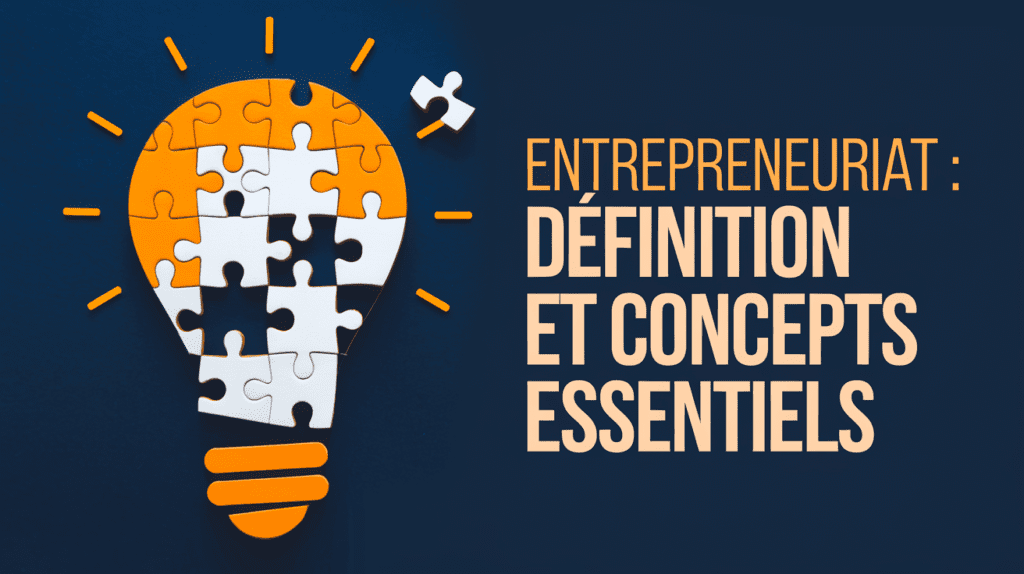- 🎯 Entrepreneurship combines value creation, innovation and calculated risk-taking
- 💡 There are 6 different forms of entrepreneurship adapted to each profile and project
- 💪 Entrepreneurial success is based on key qualities that can be developed
- ⚡ Taking action follows a precise methodology that maximizes the chances of success
- ⭐ Every year, more and more people realize their entrepreneurial dream in France
Entrepreneurship, whose definition deserves to be clarified, fascinates and attracts more and more people each year in search of professional independence. But what is the exact definition of entrepreneurship? How to get started? What are the qualities required? In this comprehensive article, we will explore all the essential aspects of entrepreneurship to help you better understand this concept and assess whether this path is right for you.
What is entrepreneurship? 🎯
Entrepreneurship is defined as the initiative to create a professional activity. More precisely, it is the fact of being the initiator and the bearer of a business project, by providing:
- The initial idea
- The necessary means
- A strong personal commitment
The different forms of entrepreneurship
| Type | Description | Main characteristics |
|---|---|---|
| Ex-nihilo | Pure business creation | Start from scratch, total freedom |
| Takeover | Purchase of an existing business | Structure already in place, existing clientele |
| Intrapreneurship | New activity in a company | Secure framework, available resources |
| Entrepreneurship by franchise | Creation under an existing brand | Established notoriety, support |
| Self-entrepreneurship | Independent activity | Administrative simplicity, flexibility |
| Social entrepreneurship | Social impact project | Societal mission, hybrid model |
The essential components of entrepreneurship 🔑
Innovation is the key!
Entrepreneurship is above all about daring to do things differently. You have to know how to identify unmet needs in the market and propose innovative solutions. Differentiation is crucial: doing like everyone else is not enough to succeed.
Dare to take (calculated!) risks
Being an entrepreneur means being a bit of a tightrope walker. You invest your money, time and energy, all while navigating market uncertainty. But be careful: there’s no question of going in blind! Good preparation remains essential.
Manage your resources intelligently
Entrepreneurial success relies on wise management of your resources. Your money must be invested in the right places, your time distributed efficiently between different tasks. If you have a team, its development becomes a priority.
Entrepreneurship and required qualities 💪

The creative spirit above all!
Creativity is the engine of modern entrepreneurship. A good entrepreneur sees opportunities where others see problems. He is not afraid to shake up habits and constantly offers innovative approaches.
Perseverance, cornerstone of success
The entrepreneurial journey is fraught with pitfalls. Obstacles become challenges to overcome, failures become valuable lessons. Success belongs to those who persist despite difficulties.
Organization, the key to success
A successful business requires solid organization. This requires effective project management, clear communication with teams and rigorous performance monitoring. Entrepreneurial success is not a question of luck, but of method and state of mind!
How to define your entrepreneurship project 🚀
Validate your idea first
Do you have a great idea? Awesome ! But before rushing headlong, take the time to test it:
- Talk about it to those around you to get honest feedback
- Study your future competitors (what are they doing well or poorly?)
- Verify that customers are willing to pay for your solution
Prepare your plan of attack
The business plan is your roadmap. No need to write a novel, but detail:
- How you will make money
- Who are your ideal customers
- How much you need to get started
- Your goals for the first 2-3 years
Choose your legal suit
SARL, SAS, self-employed… Each status has its advantages:
- Impact on your taxes and charges
- Protection of your personal property
- Credibility with customers and banks
- Possibility to evolve later
Get started!
Now is the time to make:
- Find the necessary financing
- Set up (at home or in premises)
- Start communicating about your project
- Land your first clients
And above all: don’t wait for perfection to start. You will learn and improve along the way!
Entrepreneurship is a dream but it’s not always rosy 🎯

The good sides of entrepreneurship ✅
- You are free! No more bosses and fixed hours
- You realize yourself fully by bringing your ideas to life
- The financial potential is unlimited depending on your investment
- You create a positive impact on society and employment
- No more routine: every day brings its share of new things
The most difficult aspects to manage ❌
- Intense work: forget the 35 hours, especially at the beginning
- Unstable income in the first months: having savings is crucial
- Permanent stress: clients, deadlines, tasks to manage…
- All responsibility rests on your shoulders
- Risk of failure to anticipate and prepare
The key? Weigh the pros and cons carefully before taking the plunge, and prepare yourself for these challenges while enjoying the many advantages of entrepreneurship.
Rewarding but demanding adventure
This path requires total commitment, perseverance and the ability to constantly adapt. However, with good preparation, suitable personal qualities and a clear vision, entrepreneurship can become a source of personal and professional fulfillment.
Remember that every entrepreneurial journey is unique. The important thing is to prepare well while remaining flexible in the face of changes and opportunities that come your way.
Useful resources to go further 📚
Entrepreneurship FAQ
Q: Who can become an entrepreneur?
A: Anyone can start a business, but certain qualities like perseverance, creativity and organization are important to succeed.
Q: Is a specific diploma required?
A: No, no diploma is required to start a business. Experience and skills can be acquired on the job.
Q: What is the minimum budget to get started?
A: It depends entirely on the project. Some activities can be started with very little funds, others require significant investments.
- Google Position Zero: The Ultimate Guide to Hoarding Featured Snippets - 1 March 2025
- SEO 2025: trends to follow to optimize your content strategy - 1 March 2025
- Business management training: The keys to success - 2 January 2025




